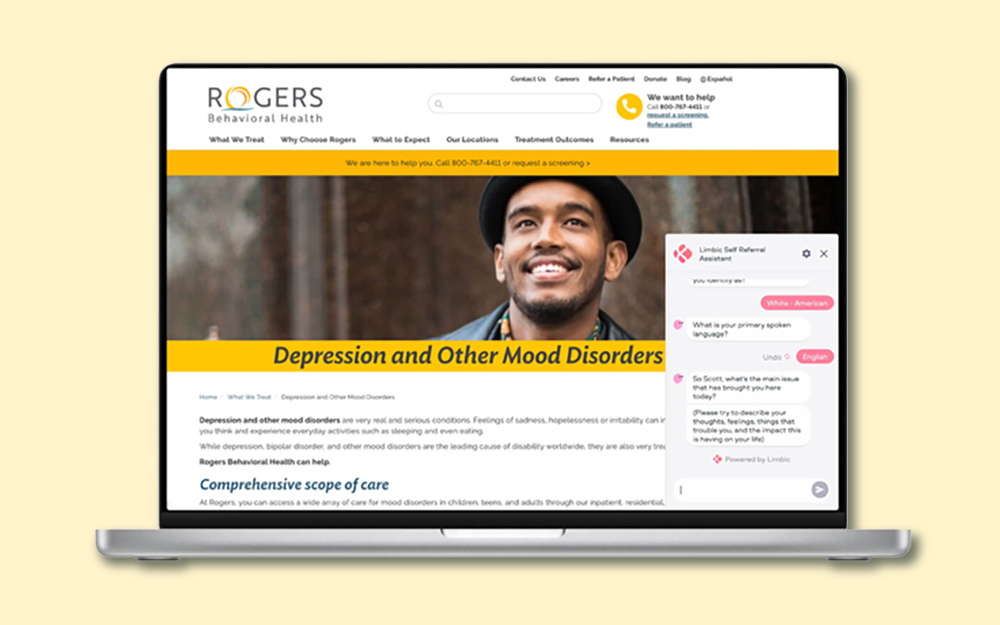You may have noticed a new friendly addition in the bottom corner of Rogers’ website. Limbic Access, an artificial intelligence (AI) chatbot creates an alternate pathway for our patients to get into the front door of care.
Rogers collaborated with the company Limbic to offer the Limbic chatbot, available 24/7 to assist with screening and chat with visitors, who can describe their concerns in their own words.
“It is a new avenue for patients to engage with Rogers that can help us make contact with patients we wouldn’t normally see,” says Signa Meyers, vice president of strategic initiatives. “This helps us open the screening process to more diverse populations and meet them where they are. We live in a day and age where some people just don’t want to talk on the phone. Limbic AI is very convenient. You don’t have to stop what you’re doing. If the prospective patient doesn’t feel up to talking on the phone, this is another safe, non-judgmental option.”
“Limbic Access is also very conversational and is built to express compassion,” says Brian Kay, chief strategy officer. “The chatbot is carefully created to be safe and ethical.”
Brian stresses AI is not a replacement for providers, and our phone screening teams are still critical to getting patients into care.
“This is an additional point for people to access Rogers,” he says. “This is using technology for good to connect people with behavioral health treatment who may not otherwise get the opportunity.”
Research shows the Limbic Access AI chatbot can increase the likelihood of historically marginalized groups seeking care. For example, a 2024 study in Nature Medicine shows the tool not only increases the overall number people referring themselves into treatment by 15%, but that the increase in self-referrals was particularly pronounced for nonbinary individuals (179% increase), Black individuals (40% increase), and individuals belonging to ethnic minorities in general (29% increase).
“Limbic has done a lot of research, and that’s why we chose them,” Signa says, adding that Rogers is also interested in looking at data related to how Limbic AI works on our website to learn more about how we can best expand access.
The National Health System in the United Kingdom is also using Limbic across their system
“We worked with Limbic to make sure this AI tool is specific to Rogers,” says Signa Meyers, vice president of strategic initiatives. “Limbic AI uses clinically validated tools to ask questions based on the website user’s direction. For example, if they’re coming to us for mood concerns, they will get a clinically validated mood screening. The user drives the experience, which is unique to the individual.”
Signa says that experience is built upon a focus on safety. The Limbic chatbot is designed to pick up on language indicating the user may be in danger.
“We have our own specific Rogers safety protocol. That was a No. 1 concern,” Signa says, adding that they worked with Jerry Halverson, MD, FACPsych, DFAPA, chief medical officer and Heather Jones, PhD, vice president of clinical services to establish the safety measures. When appropriate, the Limbic chatbot’s safety protocol includes a Columbia Suicide Screening tool, a safety message instructing the prospective patient to connect with emergency services, and an alert to Rogers so we can call and follow up.
“I’m proud to be part of a behavioral health system that’s leading the country in terms of ethically and safely employing AI to get people the treatment they need,” Brian says.
“We at Rogers aren’t the only behavioral health organizations using chatbots, but we are unique in how we are implementing Limbic AI,” Signa says. “We’re not just asking for regular information, but we are incorporating specific, individualized screening questions to meet people where they are and get them into the front door of treatment.”
Prospective patients have already given positive feedback about the Limbic chatbot, including these comments about what they liked:
“Asked questions that were extremely relevant to how I feel. Makes me feel sane.”
“Helping me identify the different stressor I have. Those being trauma, anxiety, depression and social phobia”
“Easy to Use and submit info without filling out a form”
“Hospitality”
“Not having to call in”
“Very thorough and detailed”
“Having this available online and on demand was very helpful on a weekend”
“Fast and easy”
“I appreciate not having to speak to a person at this point in the process”


